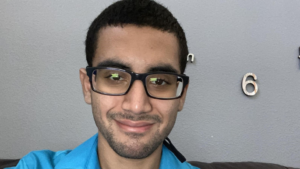This guest post is by Emily, a young woman on the autism spectrum who is currently in the process of selecting a college. Emily is applying for the Spring 2021 Making a Difference Autism Scholarship via the nonprofit KFM Making a Difference started by me, Kerry Magro. I was nonverbal till 2.5 and diagnosed with autism at 4 and you can read more about my organization here.
I hope you can support my nonprofit like I’m trying to support these students with scholarship aid for college. Learn more on how you can help our cause with a small donation (just asking for $3 today, equal to your daily cup of coffee) here.
My name is Emily. I’m a high school senior, the oldest of 5 teenagers (yes, it’s loud). I’ve moved a lot as a military brat, but I’m currently living in Fayetteville, NC. I love to write, sing and produce my own songs, read, play board games with my siblings, and drive anywhere. Oh, and I’m diagnosed with Aspergers. I keep forgetting to mention that part, because it is something I just became fully aware of recently.
My ASD story is probably very similar to a lot of others in some ways. As a baby, I never babbled: I screamed. I didn’t speak until I was a little older than 2, and when I did it was in full sentences. As I got older, I struggled socially. I was unsure of how to interact with others – I would have to be told over and over again it was inappropriate to hug or yank my peers. I often cried when I saw my classmates talking, and told my mom and teachers I thought they were laughing at me. For three years, I was hyper-fixated on everything to do with insects. I threw my whole body to the ground and screamed when my socks were a little twisted. All of these factors and more led my kindergarten to suggest that my parents take me in for psychoanalytical testing when I was 5. They eventually did and went to multiple different sources which all reported the same diagnosis: Aspergers. They gave my parents some coping tools to use with me and directed them to certain methods such as writing down all of my instructions or rules. Under these new techniques, I thrived. However, my school still pushed to enroll me in special education classes. My parents were totally against this route, as they did not think it would suit me academically – so, my parents decided to homeschool me until 5th grade.
In a lot of other ways, my ASD story is probably not like many you’ve heard before. While I was always semi-aware of my diagnosis, I did not fully comprehend what it meant. My parents never really spoke with me about it. I never consistently went to therapy after I was 7 years old. The only connection I maintained to my diagnosis was a diet.
When I reached middle school, I was doing very well. My childhood was just a bunch of fuzzy memories and silly stories to me. Frankly, I thought my diagnosis was simply a suggestion from doctors about what may have been causing my behavior when I was younger. I didn’t think I had Aspergers because I didn’t “feel autistic.” I had almost completely overcome my social barriers and was friends with everyone in my school. Even through high school, I did not feel significantly different from my peers.
Then, a lot of things happened at once. COVID and lockdown hit at the end of my junior year, I switched schools and pursued virtual education, and I began the scramble for college admissions and scholarships. This created the perfect storm for opening a discussion about my diagnosis.
All the time spent at home allowed me the space for some serious self-analysis and growth. I began sifting through the things I was experiencing and becoming aware of my strengths and weaknesses. I started researching, and realizing that a lot of the symptoms I had were in tune with those of Aspergers. For once, I saw things from a different light; maybe I wasn’t “dramatic,” I simply struggled with a heightened emotional response. And when I was snappy at people or struggling to comprehend certain situations, I was just dealing with overstimulation without any coping methods. Still, I was unsure if Aspergers really applied to me. Finally, I began applying for college scholarships, so I asked my mom if she had the actual diagnosis (which, at the time, I whole-heartedly doubted). But.. she did.
The day I read my official diagnosis was the day I finally understood. No, it wasn’t a suggestion from doctors; it was a serious medical determination made by a team of professionals. At first, I was angry. It wasn’t like this was something my parents kept from me, but they didn’t really involve me in it either. I resented them for not giving me more coping tools, more therapy, more awareness. And, I felt a lot of grief. It felt like in the world I was living in, “autism” was an insult. I thought if people knew, they would automatically assume that I was somehow less.
I confronted my parents; their response is something I will always be grateful for. They shared that they didn’t want to treat me like my diagnosis. They knew I was capable of overcoming a lot of my struggles. They wanted to push me out of my comfort zone, and were afraid if I went to support groups or therapy for children with autism I would begin to mask to those around me, rather than further my social development with neurotypical children. They explained that they didn’t want to limit me to being an autistic kid; they wanted to grant me a life where I was a kid who also happened to have had autism.
I’m still processing, still attempting to rid my brain from the stigmas against neurodiversity that society has stamped there. I’m still learning how to love myself even with Aspergers, and to love the things that Aspergers allows me to accomplish. For example, I’m able to pick up any instrument and simply play it – because of my Aspergers. And, I’m learning healthy ways to cope with the aspects I do still struggle with, like empathy. Still, the most valuable thing I’ve learned, the thing that I continue to remind myself is this: Autism does not define me – it describes a piece of who I am.

Follow my journey on Facebook, my Facebook Fan Page, & Instagram!
My name is Kerry Magro, a professional speaker and best-selling author who is also on the autism spectrum that started the nonprofit KFM Making a Difference in 2011 to help students with autism receive scholarship aid to pursue a post-secondary education. Help support me so I can continue to help students with autism go to college by making a tax-deductible donation to our nonprofit here.














